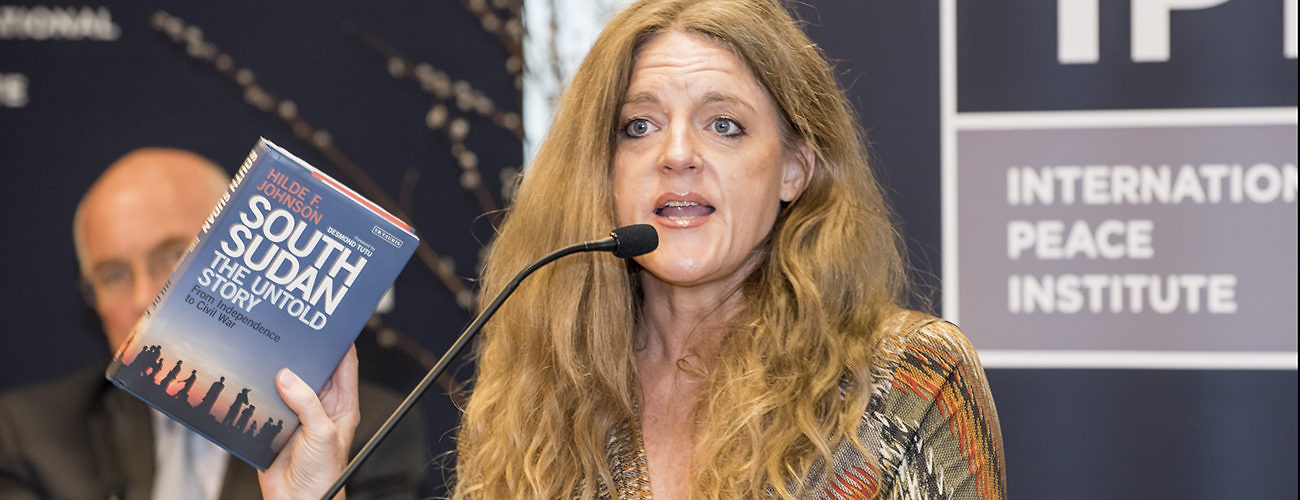Hilde Johnson, the former United Nations mission head in South Sudan and author of a new book on the country’s descent into violence since its founding in 2011, came to IPI on October 5 to describe in harrowing detail the circumstances of the fledging state’s convulsive first five years and to lay responsibility on the very people who embodied its promise five years ago.
“The betrayal by the liberators against their people is unprecedented,” she said. “The freedom fighters and the martyrs would have turned in their graves.”
Ms. Johnson knew the freedom fighters personally because as Norway’s minister of international development, she had been deeply involved in the negotiations behind the Comprehensive Peace Agreement of 2005 that ended 22 years of a north/south war in Sudan that killed an estimated 2 million people.
That agreement led to South Sudan’s eventual separation from Sudan and creation as the United Nations’ 193rd member state in 2011. From that year until 2014, Ms. Johnson served as the UN Secretary-General’s Special Representative (SRSG) to South Sudan and leader of the UN mission there.
She recalled that Salva Kiir, the president of South Sudan, warned on Independence Day 2011 that there would be “detractors” who would write off the young country as one that would reject dialogue with opponents, quickly revert to violence and “slip into civil war as soon as the flag was hoisted.”
‘Unfortunately,” she said, “two years later the detractors were proven right.”
The principal antagonists were Mr. Kiir and Riek Machar, the vice president from 2011 until his dismissal in 2013 when he became leader of the rebel faction opposed to the government.
“The South Sudanese leaders played with fire and allowed a power struggle to put everything they had fought for at risk,” Ms. Johnson said. “They all ignored the warnings that this would lead to ethnic violence.”
During her time as SRSG, the UN was forced to shift its emphasis from prevention to direct response, with some 100,000 civilians taking refuge in overwhelmed UN bases across the country.
“People suffered very badly in the protection of civilian sites,” she said. “Yet, their lives were saved. If we hadn’t done it, many would have been killed.”
The leaders of South Sudan, having caused so much of the violence, banished any hope of curbing it by their actions as fighting kept erupting again and again and Machar fled. She said it had become “the worst humanitarian crisis after Syria.”
She didn’t mince words in describing the crisis. “The outrageous atrocities committed by both sides are an abomination,” she said. “Mass killings, systematic use of sexual violence as a weapon of war, women and girls being gang raped and burned alive, horrific crimes committed against children, were beyond comprehension, the intransigence of the leaders appalling.”
And it was spontaneous and caught the UN off guard. “This was not a planned genocide,” she said. “Nobody really planned a civil war either. But the responsibility for the civil war, its escalation and the current mess we are in, rests with the two leaders. They had the opportunity to stop this senseless war a long time ago. They chose not to.”
She said that the country had faced three major transitions – from war to peace, from liberation struggle to government, and from dependence to independence.
She said that a “liberation curse” took over where people felt entitled to power and acted with no sense of responsibility for others. The army suddenly had 700 generals, likely the highest number of any force in all of Africa, and the country became the biggest spender of public funds in the region but devoted only one quarter of what its neighbors did to education and one fifth to health.
She said she hoped that a younger generation of South Sudanese leaders could save the country, “and they should be given the chance, the sooner the better”.
Acting as discussants at the event were Ian Martin, the Executive Director of Security Council Report, and Ismael Abraão Gaspar Martins, the Permanent Representative of Angola to the UN.
Ambassador Gaspar Martins said that there were too many weapons in the country and there consequently should be an arms embargo imposed. “A situation with 6.2 million people in need of humanitarian assistance with the UN camps being targeted by rebels, that’s not a situation in which we can go on with business as usual,” he said. The international community, he added, should help South Sudan regain “national ownership” of the situation.
Mr. Martin said that UN had failed from the beginning to understand the “primacy of politics” and that as a result, the relationship between the UN and the government was “actively hostile.”
“What should have been done at the outset” he said, “was to ensure a compact between the receiving government and the UN. “
The discussion was moderated by Sarah Cliffe, Director of the Center on International Cooperation at New York University. Warren Hoge, IPI’s Senior Adviser for External Relations, made opening remarks.








